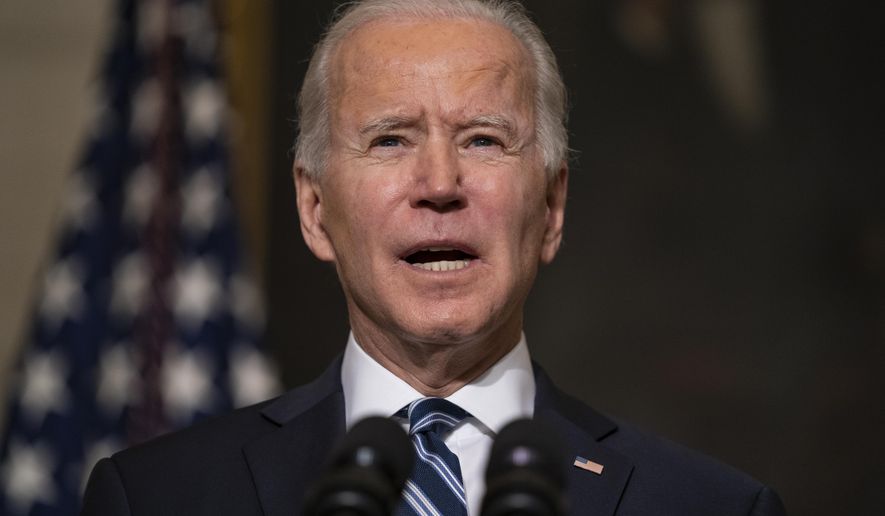President Biden said Thursday that he will reopen the Obamacare registration website because of labor shocks from the COVID-19 pandemic, a move to expand the reach of federal coverage options after President Trump targeted the 2010 program and said a special sign-up period wasn’t necessary.
The registration portal, HealthCare.gov, serving three dozen states, will reopen from Feb. 15 to May 15 under an executive order Mr. Biden signed Thursday.
The president also directed agency heads to examine whether there are roadblocks to coverage, including state-based work requirements on Medicaid coverage for the poor, which Mr. Trump authorized during his term.
Free-market advocates said the moves missed the mark, though Mr. Biden argued that he had to “undo the damage that Trump has done.”
“There’s nothing new that we’re doing here other than restoring the Affordable Care Act and restoring the Medicaid to the way it was before Trump became president,” Mr. Biden said.
Analysts are trying to figure out how many people were nudged out of job-based coverage during the pandemic. Estimates range from a few million to 10 million. Many people who lost jobs didn’t have employer-based insurance, and some employers continued paying benefits to workers who were furloughed.
Mr. Biden’s move underscores his drive to cut the ranks of the uninsured by leveraging public programs, whether it is under Obamacare, Medicaid or Medicare for older Americans, said Dan Mendelson, founder of Avalere Health, a D.C. health care consultancy.
“He has a goal of making sure everybody has coverage,” Mr. Mendelson said. “I think he will use all the tools at his disposal.”
Mr. Biden told voters he would pursue a government-sponsored plan, or “public option,” as president and lower Medicare eligibility to age 60.
Republicans in Congress are likely to block those plans and insist on free-market changes as the path to coverage, leaving Mr. Biden to explore moves he can make on his own.
It is not clear whether reopening HealthCare.gov will amount to more than a marketing push for the program that Mr. Biden and President Obama muscled to passage more than a decade ago.
People who lost job-based coverage during the pandemic would have qualified for a special enrollment period anyway, and Medicaid enrollment in the federal-state program for the poor ballooned by 6 million from February through September.
People also had the chance to sign up during the normal enrollment period that concluded in December. More than 8.2 million people signed up on the federal website, a 6% increase over the prior year. States that operate their own portals will report their numbers soon.
Obamacare expanded Medicaid in dozens of states and set up online markets where people could buy insurance with the help of federal subsidies, extending coverage to more than 20 million Americans. Yet coverage rules brought a flood of sicker customers into the market, pricing healthier people out of plans.
Critics said Mr. Biden should focus on the law’s flaws instead of adding to market instability.
“Policymakers understand that the reason the Affordable Care Act instituted an open enrollment period in the first place was to discourage consumers from signing up for coverage only when they get sick,” said Hadley Heath Manning, policy director at the Independent Women’s Forum, a conservative nonprofit. “Of course, the extenuating circumstances of the pandemic have put many Americans in difficult and uncertain circumstances regarding their health and financial security. That said, reopening the open enrollment window is not likely to mitigate this, as qualifying life events, such as job loss, always trigger an opportunity to enroll in ACA coverage. What Americans really need are better, more affordable options for health insurance — options destroyed by the ACA — not just more time to sign up.”
The main insurers’ lobby, America’s Health Insurance Plans, said it applauded “the call for a targeted special enrollment period that is accompanied by robust consumer outreach and education.”
Danny McDermott, a research associate at the Kaiser Family Foundation, said the level of outreach before the February-to-May enrollment period will set it apart from those under Mr. Trump.
“The big difference is that the open enrollment period occurred during the Trump administration,” Mr. McDermott said.
He said Mr. Trump, who sought ways to chip away at the health care law after Republicans’ repeal attempts failed, slashed much of the funding set aside to promote Obamacare or dispatch sign-up helpers known as “navigators.”
“It is expected that Biden will reinstate much of that funding,” he said.
HealthCare.gov has roughly $1.2 billion in unspent revenue from user fees that Mr. Biden could devote to marketing and outreach, he said.
“We will have a robust public campaign,” White House press secretary Jen Psaki said. She said the government doesn’t have an estimate of the number of people who might take advantage of the special sign-up period.
Mr. Mendelson said Mr. Biden’s decision to reopen HealthCare.gov will make signing up simpler than the existing protocol because registrants won’t have to attest how they lost job-based coverage.
Later Thursday, the Department of Health and Human Services confirmed that the sign-up period will be open to “all marketplace-eligible consumers who are submitting a new application or updating an existing application.”
The Kaiser Family Foundation estimates that 15 million Americans could be purchasing coverage on the Obamacare marketplace but haven’t enrolled because they don’t know about their options or find the deductibles or premiums unaffordable.
The foundation estimates that nearly 9 million of these people would qualify for federal assistance based on income, including 4 million who could get a bronze plan free of charge with a $0 premium.
Some people who go to HealthCare.gov during Mr. Biden’s special enrollment period might end up on Medicaid because systems automatically refer them based on income.
• Tom Howell Jr. can be reached at thowell@washingtontimes.com.




Please read our comment policy before commenting.